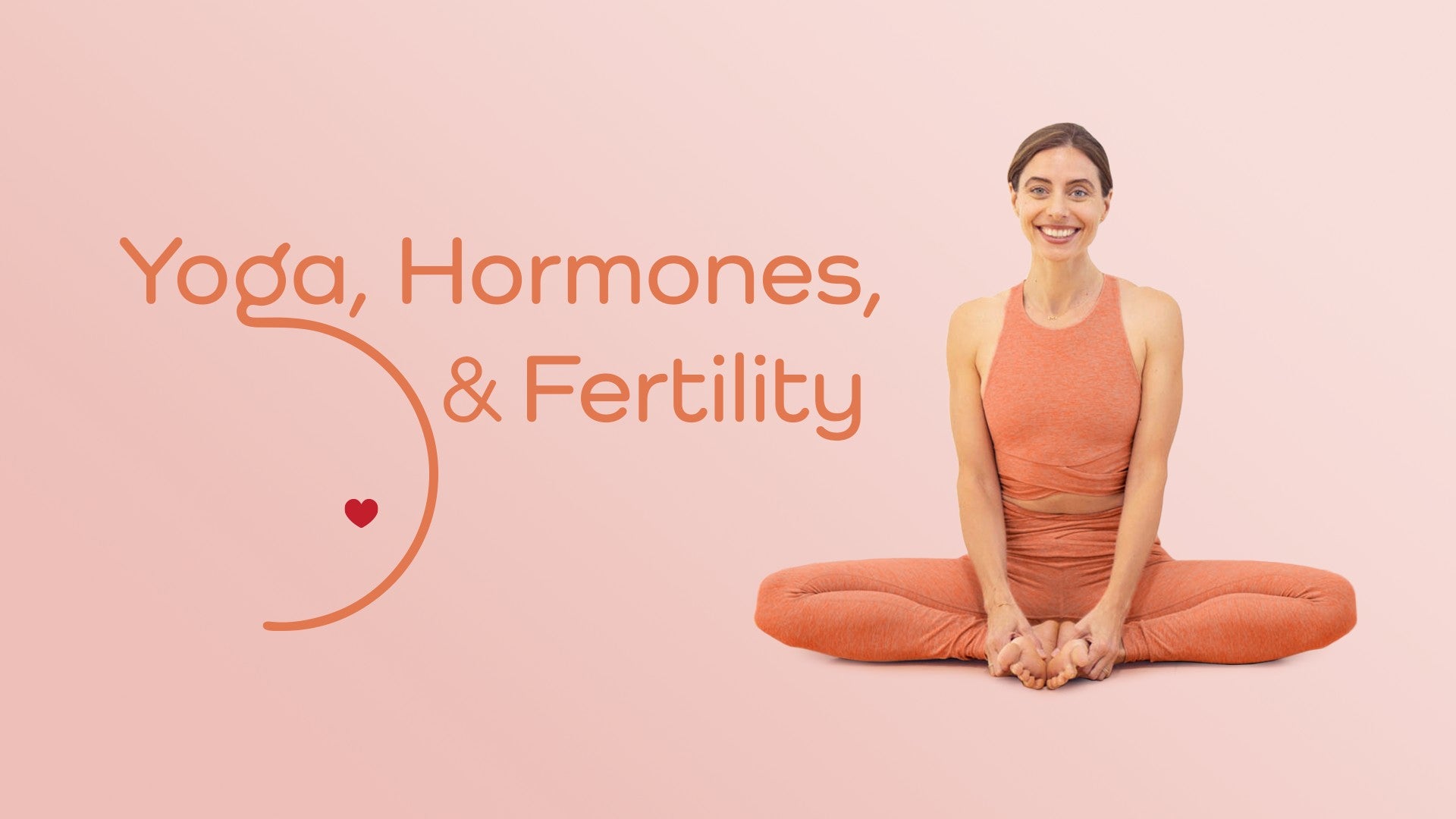Description
About This Video
Transcript
Read Full Transcript
Welcome, thank you for joining me today. So today we're going to talk about hormonal imbalances. So we kind of have an idea of what a normal 28-day cycle looks like. And there's varying degrees of imbalances, some more significant, some really don't matter. Every month things are fluctuating, there's a lot of things that can throw things off if you're more stressed out.
That can make your menstrual cycle shorter, more painful, maybe heavier. And that's okay if it's one month, but when things start to pile up and it's month after month and stress levels start to increase and increase, maybe things get a little bit more messy. And then there's a lot of conditions, a lot of diagnoses out there that can affect your hormones and your fertility. And some of them are lifestyle related and some of them are not. Some of them are, there's a genetic component.
Some of them, we don't even know why, why they happen. But one place where we do have power is in whatever it is that we do in our lifestyle. So within the discussion of genes, there's genes and there's genetic reasons for any disease, but there's another thing called epigenetics. And this is the components that actually turn on the genes and cause actually these genes to be expressed. And the things that we can do to kind of, you know, prevent these genes from, certain genes from being expressed always goes back to what we all know.
It's usually diet, lifestyle, and now something that's actually really important is limiting toxic exposures because our environment is so heavily polluted, the air we breathe, the water we drink, the foods we're eating, the EMFs that we're exposed to on a day-to-day basis. All of these things are having an effect on our system and potentially on our fertility. And this isn't to scare anyone or to be fear-paced, but if you are having issues with hormone regulation then it's a really good thing to start to look at. I always recommend drinking pure filtered water and eliminating just about everything except for H2O and maybe adding some minerals in, the foods we eat, you know, if we consider our lifestyle and how fast-paced it is, especially if you're in a big city but anywhere really, women are working, most women are working full-time, not all of them, but even if you're not working full-time, there's still a lot of responsibilities to manage in a household. Life is complicated now.
It's not simple. It's always been complicated, but it's a different level of complicated now. And so the stress levels are enormous and then we throw on top of that that we have chemicals in our water that we have to try to eliminate. We have foods that are genetically modified, which are still fairly new to our organisms. We really don't know what they're doing to the body.
It's all in unknown. Pesticides that are being used in the foods, that's having an effect as well. Other environmental factors are the EMFs. This is very new for us and it's in our phones, there's wiring in all houses, all buildings, and so we're really being exposed to a lot of EMFs. And laptops on our laps or on our stomachs, that's something we want to avoid doing.
Cellphones in our pocket. There actually have been some studies on male infertility and so they've looked into that. So keeping cell phones away from reproductive organs for sure in a bag or not even keeping them far away from you, that's a major thing that can affect your fertility. Just the level of stresses that we have in life really prevents us from living a life that's based around community and based around relationships. And one major thing that we usually historically have communed over is food.
It's how we've picked where we're living and it's what we've all done together socially. I think a lot of people eat alone and it's usually on the run. We're often running to work or to a bunch of errands and in that process what winds up happening is we pick up foods that are really fast and easy to eat but not what's really nourishing our body. So these foods tend to be either high sugar or high carbohydrates and blood sugar management is probably one of the most, probably the thing that I deal with most with clients is that people are just dropping down into hypoglycemic states or they're reaching insulin resistant states. And this has a huge effect on hormones but it also can lay the groundwork for conditions, well you know it's not necessarily the cause of PCOS but it is a huge way of treating it.
One of the main courses of treatment from a western medicine perspective that's gotten the best results is by using metformin which is diabetes medication. So blood sugar management is really important and managing your blood sugars by eating a diet that's really high in healthy fats, avocados and olive oils and coconuts, even a little bit of animal fat is good, dairy if you can digest it and then protein, having more protein and less of those complex carbohydrates and sugars. And if we look at even the things that we drink a lot of times the beverages are really high in sugar content so I'm not one for like fad diets, I think that having real food is what's best, just eating a whole variety of foods, particularly vegetables, some fruits, whole grains, legumes, animals, fish if you agree with it ethically and it's a part of what you can eat. And then each person is individual and what works for their system, you know you have to honor that and your belief systems is a part of that as well. But sugars are a pathology of our times, we all eat way too many sugars and so minimizing the amount of sugars that you take in both your food and beverages is a really good idea.
Same with caffeine, you know it's our liquid energy, this is how we get through our day and I'm surprised by how many people actually feel significantly better once they stop drinking caffeine, not everybody, but a lot of people actually stop drinking caffeine and then they actually find that they have more energy just by hydrating, by drinking water and there's nothing wrong with a little bit of caffeine but when you're relying on it to get through your day, it can throw off your cortisol melatonin balance and then you can start having some issues with sleep, you just wind up having a really nervous nervous system, you're always on edge and that is a stress and your body becomes more inflamed even just from that. So minimizing some of the caffeine and then alcohol and stimulants can also be a problem too. So in general, I think we have to look out for marketing in our foods. My husband always says there's a difference between food and food products and we're really marketed to and most of us are eating food products and they're healthy food products, they're organic, they're gluten free, they're in these nice little packages that look very earthy and safe but in the end they're still products, it's not the same as going at home and cooking a fresh meal that you've bought from all the ingredients from a farmer's market or better yet you've grown on your own. So taking the time to nourish yourself is so, so key.
We spend all of our time working and doing and a big part of honoring ourselves is just finding times to be and live and food is such a big part of living and enjoying the food foods that you're eating and really respecting that process is incredibly important and having food with friends or family and enjoying the community aspect of it is also great. It's not only the nutrition that we gain from our food but it's being nourished by the environment that you're eating it in, that's really beautiful and helpful. And on that note I think when I think of my own life and I think about how I live, there's a lot of activity. I wake up and I'm going and I work and then I'm running to possibly do something for myself which is usually exercise, yoga, continually doing for my daughter, my husband. We all have very active lives and that's great, it's beautiful.
But I think it's also important for us every once in a while to start to question is our life whole? We're active and we're busy and we may love everything we're doing but are we really having a well balanced life? So do we love our work so much that all we're doing is working? Do we love our yoga practice so much that all we're doing is yoga? Do we love our family so much that all we're doing is spending time with our family or doing for our family?
Do we love ourselves so much that all we're doing is taking care of ourselves? And I think imbalance in any of that can actually lead to not feeling really fulfilled. I think if you can start to spread out your time and your energy between all of those things we're starting to balance the yin and yang within ourselves. And so yin and yang, Chinese medicine, they're the two main energies that govern us and yang would be like masculine and yin would be feminine. Progesterone which causes like warmer body temperature would be yang and estrogen which causes cooler body temperature would be yin.
And so we can start to think about that in our life like what are the things that are more like drive and action and pushing me forward in the world or you know on some level we think we're going forward in the world and what are the things that are more like nourishing and allowing me to be and be with myself, be with love, just be. And finding a balance between those energies in ourselves is another way not only to have a more complete and whole life but also just to, it can also help affect your menstrual cycle. I like to talk through with clients like in the beginning part of our menstrual cycle, we're in this yin phase. We're starting to build the endometrial lining, things are, yin is like substance, it's cooler. And then in the second half of the menstrual cycle we're in this yang stage, we have a hotter body temperature, we have progesterone levels higher.
And so there's more of a yang aspect there. And when we're actually bleeding, you know, this is another time where we just want to start to surrender and allow for the yin to come in. So we do a little bit less movement, a little bit less action during that time. So in everything that we do we really just try to find balance and harmony in our exercise and our lives and our food. And I would love to hear if you have questions for me on the forum, please reach out and I will get back to you as soon as I can.
So thank you for joining me and namaste.
Yoga, Hormones, and Fertility: Balance Your Hormones
Comments
You need to be a subscriber to post a comment.
Please Log In or Create an Account to start your free trial.








